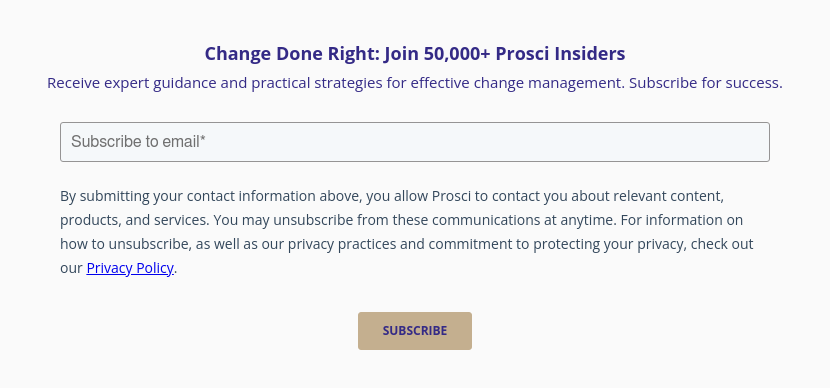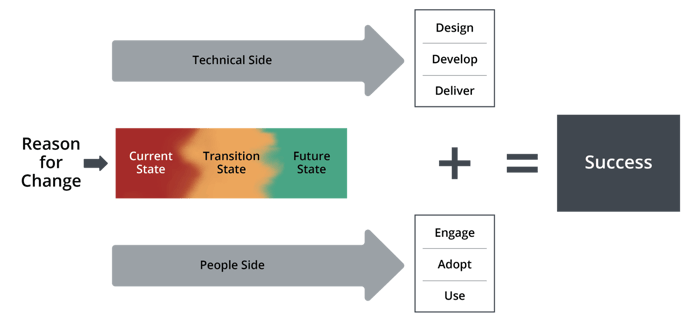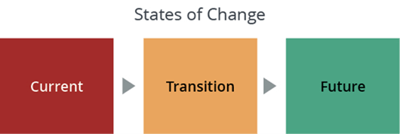
Resistance Management and the Prosci 3-Phase Process
Developing an intentional approach for managing resistance to change is built into the Prosci Methodology and 3-Phase Process.
Phase 1 – Prepare Approach
Resistance prevention begins when creating the Change Management Strategy deliverable during Phase 1 – Prepare Approach. These actions focus on early identification and anticipated points of resistance, so special tactics can be developed early in the change process. These tactics are informed by an understanding of what the change means to people. This takes place during the Define Impact stage. Specific risks are also surfaced when completing the Risk Assessments.
Phase 2 – Manage Change
Resistance prevention actions and activities are built into Phase 2 – Manage Change under the Plan and Act stage. This equips individuals to move through their ADKAR transitions and enables the change team to address likely barriers to change. Resistance response activities for persistent, pervasive resistance are built into the Adapt Actions stage.
Specific elements of resistance management activities are also often integrated with the Sponsor Plan and People Manager Plan. Depending on the size of your project or initiative and the level of resistance you anticipate, you may wish to develop a separate Resistance Management Plan for your project or initiative. The Resistance Management Plan is an optional plan you can develop during this phase to extend the impact of your resistance management efforts. As an “extend” plan, this plan would complement the core plans (Sponsor Plan, People Manager Plan, Communications Plan and Training Plan) when the situation calls for additional tactics to address resistance to the initiative.
Phase 3 – Sustain Outcomes
During Phase 3 – Sustain Outcomes, we review performance to understand the initiative progress, ADKAR outcomes, and status of change management activities. Resistance management during Phase 3 – Sustain Outcomes consists of assessing performance of resistance management activities and documenting lessons learned for the future.
Anticipate, Integrate and Activate
Managing resistance to organizational change involves effectively anticipating resistance, integrating resistance management actions and activities into change management plans, and then activating the people-facing roles within the organization who will conduct the resistance management activities.
Anticipating Resistance
During Phase 1 – Prepare Approach, we define the overall change management approach, which includes developing special tactics to address anticipated resistance. Suitable tactics could take many forms, depending on the people and roles impacted, the nature of the change, your unique organization, and other relevant issues such as budget and resources. The output from these tactics will inform the actionable steps and activities you create to embed in your ADKAR Blueprint or Master Change Management Plan.
Eliminating avoidable resistance is a significant area of opportunity for change practitioners. Much like preventative healthcare, anticipating and addressing resistance before it starts can lead to a much healthier, less costly experience with change with better outcomes for the entire organization.
Effectively anticipating resistance to change in your organization requires assessing it from three perspectives:
1. By impacted group
The way various impacted groups will respond to change varies depending on the nature of the change and degree of impact. Performing a group impact assessment enables you to identify the ADKAR barrier point (Awareness, Desire, Knowledge, Ability and Reinforcement) for each group. You should also assess unique group considerations. For example, will the finance team lose a favorite functionality when the new and improved accounting system goes live? The outcome informs the tactics you will use to prevent avoidable resistance and manage resistance in each group.
2. By organizational level
Why individuals resist change varies at different levels of the organization. Executives tend to resist change due to a disconnect with their strategy, financial objectives, or compensation. People managers typically resist change due to lack of awareness, loss of power or control, and overload of current responsibilities. Employees often resist change due to lack of awareness of why the change is happening, not understanding the WIIFM (What’s in it for me?), comfort with the status quo, and fear of the unknown. This information informs development of special tactics to address resistance at each level throughout the change management process.
3. By organizational attributes
The Prosci Risk Assessment examines change characteristics and organizational attributes to define the “people risk” of a change. Reflecting on the scores for the organizational attributes―specifically looking at scores of 4 and 5―highlights specific areas that require a special tactic to address potential resistance. Examples include change capacity, history with past changes, organizational reinforcement, and change management competencies.
Integrating Resistance Management Throughout the Project Lifecycle
As a project or change initiative moves from the initial phases of design toward implementation, the project team should consider how resistance will be identified throughout the project lifecycle, such as by implementing specific mechanisms (measurement tools and soft measurements) to identify resistance. This activity would be considered a component of resistance response. Examples include:
- Employee feedback – Include employee feedback loops as a component of the Communications Plan and People Manager Plan
- People manager input – Give people managers the opportunity to provide direct feedback to the project team during coaching activities
- Project team issues – Issues that are identified by the project team should be logged directly to the project issues log or risk log to be monitored closely
- Compliance audits – Compliance audits conducted as part of the post-implementation support activities and focused on proficiency metrics will identify additional areas of resistance where support is needed
Activating Roles That Manage Resistance
Change practitioners bring a structured approach to change management, which includes taking steps to build awareness about why the change is happening, why it is happening now, and the risks of not changing. Through these actions, change practitioners address the number one reason for resistance to change: lack of awareness of the reason for change.
But change practitioners can’t do this alone. They must activate key roles to work with them. Like directors of a play, change practitioners work behind the scenes to engage and equip senior leaders and people managers “on the stage” for their employee-facing roles during change.
Senior leaders help manage resistance by communicating the business reasons for the change directly to impacted people and groups. People managers help manage resistance by working with the people and teams who report directly to them.
People managers are particularly important in resistance management. As resistance managers for front-line employees, they identify resistance, address root causes from both a personal and organizational perspective, and take appropriate actions required. Change practitioners prepare, equip and support people managers for their resistance manager role by focusing on:
- How to have open and honest conversations and coach their employees
- How to communicate key messages in a way that connects with the interests of their employees
- How to identify barriers points and work to address them
- How to help their employees be successful after the change is fully in place
Note that leaders and people managers are employees first and managers second. Prosci research participants consistently identify mid-level managers as the most resistant group. This affirms how important it is for them to go through their own ADKAR transition before they can advocate for the change and manage resistance effectively.
Improve Project Outcomes
Resistance is a natural reaction to change. But we have the power to control the duration, cost and impact of resistance. How we support our employees through the change process and manage resistance to change minimizes the impact to employees, increases the effectiveness of the overall change management program, and opens the door to improved project outcomes and benefits realization.







